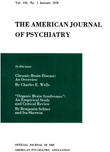Abstract
In keeping with observations reported in previous studies, the mothers of the ulcerative colitis patients had experienced a lack of warmth and maternal care. Their mothers consistently were characterized as cold, severe, domineering. They all felt they had failed to win love and affection despite serious effort to do so. While hostility toward their disappointing mothers is apparent, their dependency and great sense of insecurity, masked by compensatory patterns of independence and self-sufficiency, is more marked.
Toward their children, patterns that superficially seem not unlike those of their own mothers are evident, in that they too seem to be domineering and controlling mothers. Where it has been possible to observe this pattern more closely (Mrs. D., Mrs. F. and Mrs. A.) it has been seen that this effort at control is motivated by deep fear that failure will have disastrous consequences. The potential disaster stems in part probably from their own destructive wishes toward the child, e.g., Mrs. F.'s death wishes toward and fear of the patient's death. The effort at control proves to be unsuccessful and the mother suffers the narcissistic pain, anxiety and discouragement of a sense of failure in her actual inability to meet the child's needs as her mother had failed to meet her needs. Anxiety stems from the feeling of lack of support and acceptance by their mothers initially and by the later reality of lack of supporting figures, chiefly the husband. Mrs. E., who had previously cared for 5 children, was finally overwhelmed by the brutality of the alcoholic father who physically threatened her life. She unsuccessfully attempted to withdraw from the situation entirely.
The mothers then, are anxious and fearful persons who desperately and unsuccessfully attempt to control in a situation in which they feel adequate support is not exercised by dependable parental figures. Their anxiety is augmented by their sense of inadequacy to meet demands made upon them and by the actual failure to provide for their own dependent needs and those of the child. The illness of the child eventually serves for them as a confirmation of their own inadequacy and of the undependability of the environment.
The role of the father as a factor in the determination of the illness is more variable than that of the mother. His ability or inability to emotionally support the mother in her maternal role is a basic consideration. Some of the fathers failed in this respect, but were ill, dependent, relatively incompetent in solving the problems of practical living. In one instance it was felt that the father's destructiveness was the chief factor in rendering the mother incapable of meeting the child's needs.
A relatively benign relationship of the father toward the mother and child will not necessarily protect the child against illness when the mother's disturbance is dependent upon traumatic experience not primarily related to the father. Yet the presence of a father with qualities favorable for resolving the childhood conflicts toward him, in keeping with normal emotional growth and development, would appear to influence the course of the illness favorably.
1. All the mothers of the children suffering with ulcerative colitis studied reacted to their failure to win the love of their own mothers, with varying feelings of inadequacy and ineffectiveness about their own maternal role, or with defenses against these feelings.
2. The world is seen by them as a dangerous place in which one survives only by one's own effort. They develop patterns of control, motivated by fear of the disastrous consequence of failure. The efforts are felt to be potentially ineffective because of the fantasied self-deficiency.
3. Events in the external life, or relating to the pregnancy with the child who develops ulcerative colitis, are such as to further lessen the mother's ability to function as a giving mother, because of her emotional depletion and decreased energy.
4. The pregnancy and period of early care of the child is experienced as damaging to the mother, undesirable or otherwise reacted to narcissistically, rather than with gratification in meeting the needs of a child.
5. The illness of the child serves for the mother as a confirmation of her own inadequacy and of the undependability of the environment.
6. The father's ability or inability to support the mother emotionally is a basic consideration. His influence is primarily mediated through the mother, but it may be a principal factor in rendering her incapable of meeting the child's needs.
7. The indications are that the biological security of the child initially is threatened by the mother's inability to care for him.
8. Fantasies about the inadequate and destructive nature of the mother, and of her nurturing effort, express the child's hostility and anxiety evoked by the failure to achieve needed security and gratification in his relationship with her.
9. As observed in the cases under treatment, the child's response to parental inability to solve problems of living, and to meet needs, is an effort at independence and a striving to himself meet the needs not adequately met by the parents.
10. The overstriving of the child suffering the ulcerative colitis is a life-saving maneuver, evoked by fantasied danger of abandonment to destructive forces, maternal or environmental.
11. Failure in the compensatory effort to assume parental responsibility himself is associated with augmentation of symptoms and feelings of helplessness.

